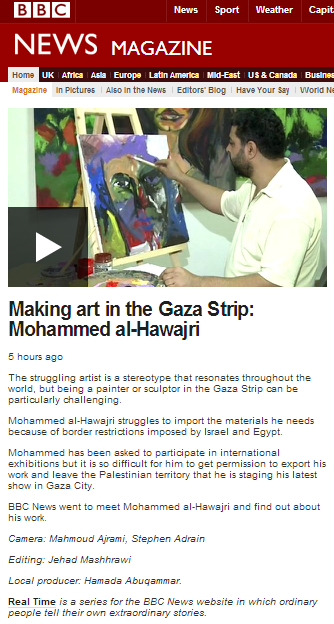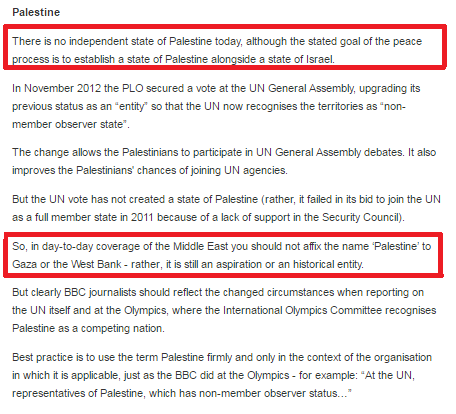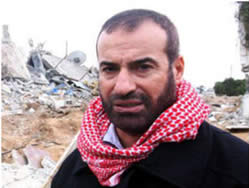h/t J
The BBC World Service radio programme ‘Business Matters‘ is described as follows:
“Key global business news in Europe, the Middle East and Africa, with live guests and contributors from Asia where the day is beginning and the USA where the day’s business is coming to an end.”
The programme’s February 6th edition included an item (available here from 10:40) described in the synopsis as being about:
“…the Palestinian women’s group trying to export their embroidery to Europe.”
Presenter Roger Hearing introduced the item as follows:
“Now, Hebron is one of the biggest Palestinian towns but it’s also one of the poorest on the West Bank. Over the last decade and a half, security problems in the West Bank and the resulting Israeli restrictions on Palestinians working in Israel or moving goods through checkpoints have made it extremely difficult to set up or run businesses in towns like Hebron. Large numbers of Palestinian men remain in Israeli detention. Now a group of women in the town led by Nawal Slemiah have set up an embroidery workshop using traditional Palestinian techniques; in the beginning to sell to tourists. But now Nawal has been in Britain to try to build up a market here. She told me about the project.”
Hearing’s euphemistic reference to fifteen years of “security problems in the West Bank” of course refers to Palestinian terrorism – beginning with the second Intifada in 2000. Whilst failing to accurately name or describe those “security problems” and similarly refraining from clarifying the related issue of why “Palestinian men remain in Israeli detention”, Hearing is less coy about describing “Israeli restrictions”. But are his claims accurate?
According to the latest figures from the Palestinian Central Bureau of Statistics, the general employment rate in PA controlled areas and neighbourhoods in eastern Jerusalem stood at 82.6% during the fourth quarter of 2014 and in the Hebron governorate the employment rate during that period was 78.7% (see Table 18 at the link above).
Of those in employment in those areas, 15.6% worked in “Israel and settlements” during the last quarter of 2014, with the figure for the Hebron governorate being 18.3% (Table 20). According to Hearing’s presentation of the issue, we would expect the overall number of Palestinians working in Israel to be very few due to those “restrictions” he cites. As can be seen in Table 22 at the link above, the PCBS states that 85,000 people from PA controlled areas in Judea & Samaria worked in Israel during the last quarter of 2014 and a further 20,200 worked in ‘settlements’.
As we see in the table below (page 40) the percentage of Palestinians from PA controlled areas and neighbourhoods in eastern Jerusalem employed in “Israel & settlements” has varied between a high of 21.4% in the year 2000 (the Intifada commenced at the start of the final quarter of that year) and a low of 10.7% in 2004. As the security situation improved, the figures rose and the percentage of people employed in 2014 in “Israel & settlements” was only slightly below the figure for 2001. In other words, Hearing’s inference that fewer Palestinians are working in Israel than was the case fifteen years ago does not have strong statistical backing.
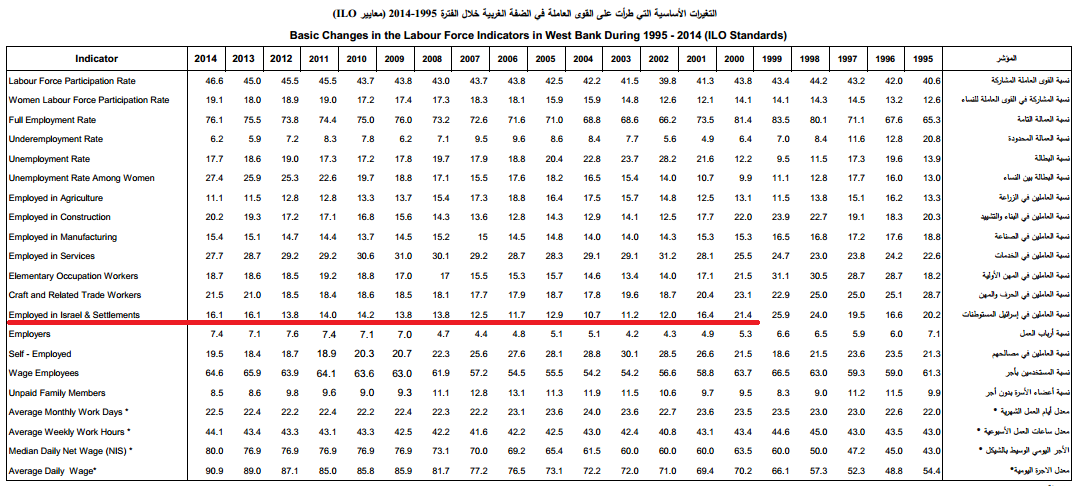
And what of his claim that because of Israeli security policies it is “extremely difficult to set up or run businesses in town like Hebron”? Hebron is of course situated in Area A and there and in Area B, the Palestinian Authority is solely responsible for regulation concerning business ventures. According to the PCBS, 66.2% of those in employment in the Hebron governorate work in the private sector (Table 32). 20.8% are self-employed and 9.3% are employers (Table 31). By way of comparison, the percentage of self-employed people in the UK stands at around 15%. In other words, despite Hearing’s claim, over a fifth of the people in employment in the Hebron district have managed to set up and run businesses.
One very important industry in Hebron is stone-cutting and according to USAID:
“Palestinian stone exports account for more than $100 million annually, making stone one of the top Palestinian export products and a leading source of jobs. An estimated 500 companies employ approximately 16,000 workers across the West Bank, with approximately 100 of those companies located in the Hebron Industrial Zone.”
Despite Hearing’s claims of “difficulties moving goods through checkpoints” (the number of which has also been reduced as the security situation improved over the years), in November 2014 alone goods worth $76 million were exported via crossings into Israel where some 1,600 commercial transfers take place daily and the average transfer takes 45 minutes.
So where did Roger Hearing obtain the obviously selective and over-simplified information which caused him to present such an inaccurate and politicized picture to BBC World Service listeners? The answer to that is unclear but it may of course have come from his interviewee herself or perhaps from whoever initiated the contact between Nawal Slemiah and his programme’s production team.
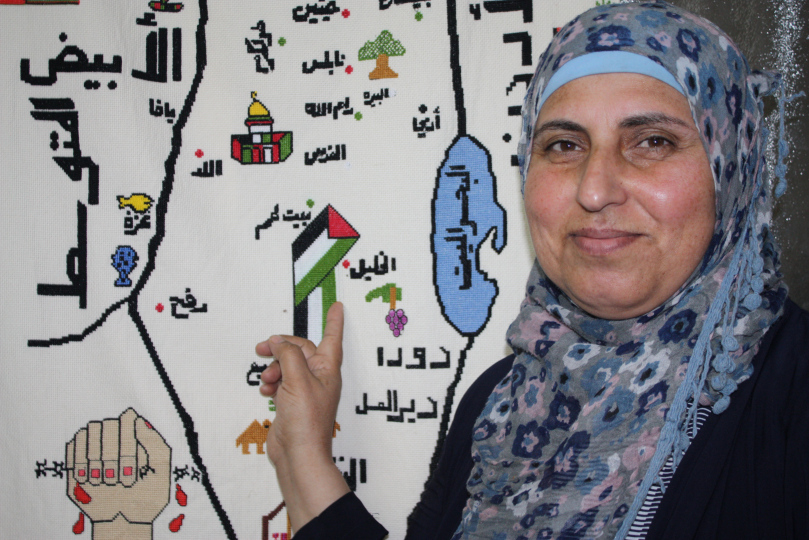
This is not Ms Slemiah’s first visit to the UK: she has travelled there on several previous occasions since 2013 and her speaking engagements were mostly with political campaigning groups such as Manchester Palestine Action, the Palestine Solidarity Campaign, Students for Justice in Palestine, the Quakers and trade unions.
As those who listen to the item in full will appreciate, this is by no means a story about “key global business news”. It is in fact an exercise in political messaging which uses the commercial aspect of the story as a hook and – despite the existence of editorial guidelines which state “[w]e must not endorse or appear to endorse any other organisation, its products, activities, services, views or opinions” – provides a bit of free advertising by means of the promotion of Ms Slemiah’s website at the end, as well as on Twitter.
It would therefore be very interesting to know just how ‘Business Matters’ was made aware of this story and whether any of the political campaigning groups with which Ms Slemiah is associated played a role in that matchmaking.

